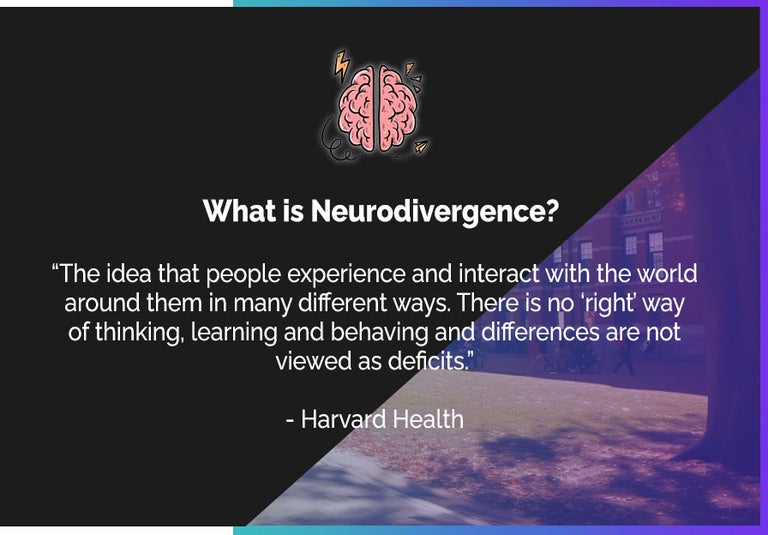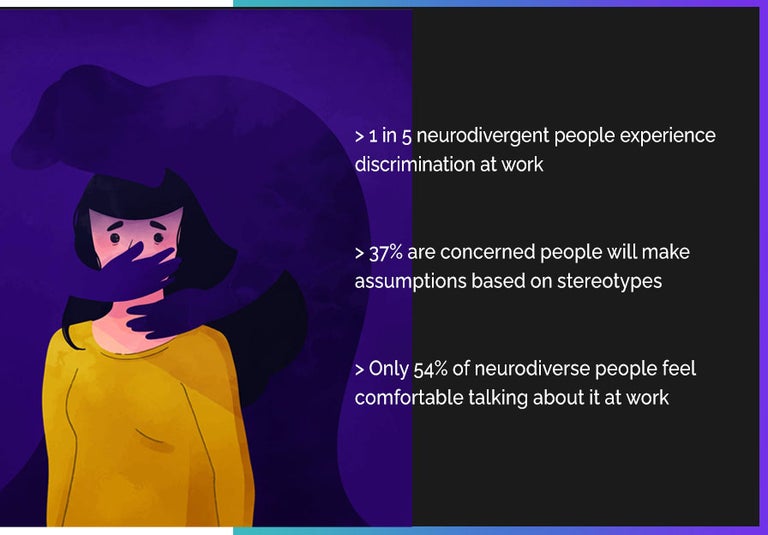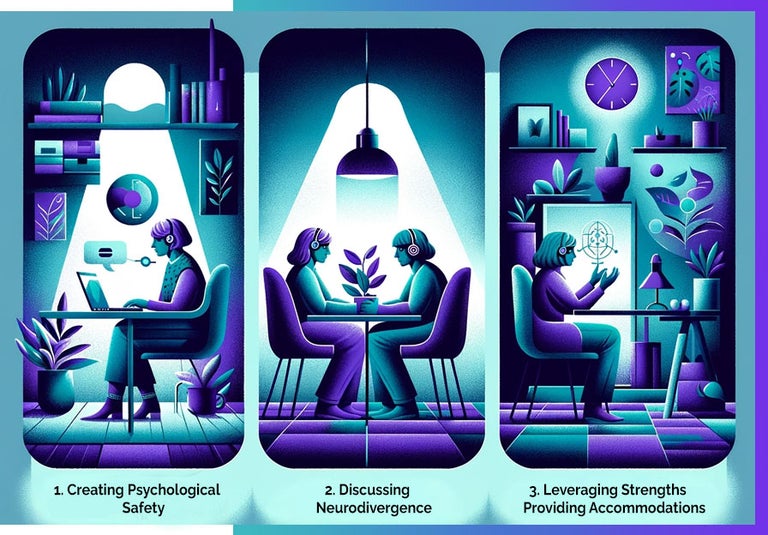Contents
- What is Neurodivergence?
- Technology Attracts Neurodivergence (It Always Has)
- Neurodiversity is Still Widely Misunderstood
- Neurodiverse Team Members Are Better With AI
- 3 Ways to Help Your Neurodiverse Team Members
- The Future of Work is Neurodiverse
Greta Thunberg. Bill Gates. Elon Musk. Emily Dickinson. Albert Einstein. This could be a list of some of the most brilliant people who have ever lived. People who have set the pace of change, built the future, and created startling works of art. But it isn’t. It’s a list of people who are neurodivergent.
And now with the rise of remote work, neurodivergent people have another advantage: the ability to work with AI in ways that make it better.
Do you have neurodivergent people on your remote team?
This is perhaps the highest value remote worker that exists right now. And more than half of neurodivergent people in tech won’t disclose their status.
That’s a HUGE problem for leaders focused on AI innovation.
Here’s how to 1) create psychological safety for workers with cognitive differences, 2) identify your neurodivergent workers, and 3) get them involved with or trained up on your team’s AI implementation.
What is Neurodivergence?
Neurodivergence is a different way of experiencing and engaging with the world.

Harvard Health describes neurodivergence as “the idea that people experience and interact with the world around them in many different ways. There is no ‘right’ way of thinking, learning and behaving and differences are not viewed as deficits.”
Take note of that last bit: neurodiversity is not a disability. More on why that’s important for the success of AI in your remote team a bit later.
Some types of neurodiversity include autism spectrum disorder, ADHD, dyslexia, hyperlexia, OCD and sensory processing disorder. There are loads of variations and many neurodiverse people have more than one thing under this umbrella.

Technology Attracts Neurodivergence (It Always Has)
How do you perceive the world around you?
If you answered: ‘Differently’ you may be neurodivergent.
About 20% of the world’s population are neurodiverse in one way or another.
Yet according to the Tech Talent Charter’s Diversity in Tech Report, only 3% of people in tech are neurodivergent.
If that doesn’t sound right to you, it’s because it isn’t.
An informal poll in 2023 by the same company discovered that 57% of neurodiverse people in tech didn’t disclose it to their managers.
If you’ve worked in tech, you know. There are a lot of people with cognitive differences around. And many of them are uniquely capable, brilliant people.
Heck, the HBO show Silicon Valley, had a lead character (Richard) who was neurodivergent. That’s how pervasive the stereotype is in the industry.
But disclosing neurodivergence has historically been detrimental for tech workers. And because of the lingering stigma attached to the label, they don’t do it.
If only 40% of tech workers are neurotypical – why the hush hush?
Neurodiversity is Still Widely Misunderstood
In the past, neurodivergence was treated as a disorder or disability, instead of what it really is: a different type of cognition.
Based on a CIPD February 2024 study:
- 1 in 5 neurodivergent people experience discrimination at work
- 37% are concerned people will make assumptions based on stereotypes
- Only 54% of neurodiverse people feel comfortable talking about it at work

Stigmas persist, and it’s keeping potentially star-players on the bench.
Consider that Deloitte has research that suggests teams with neurodivergent professionals can be 30% more productive than those without them.
Now, a new study says that your neurodivergent team members may be the solution to your AI innovation woes.
Neurodiverse Team Members Are Better With AI
Research has emerged that shows neurodivergent people are often better equipped to handle AI systems, processes and models.
It matters.
We already know a fully-remote environment is the ideal for many neurodiverse workers. The flexibility gives them the autonomy they need to excel at work.
So, we know working remotely makes the prevalence of neurodivergent talent more likely, and we know tech has huge numbers of hidden-in-plain-sight workers with neurodivergence.
What you don’t know is:
- Who these individuals are
- How they can help you escalate, broaden and improve AI adoption
And that’s a tough pill to swallow!
Because you can’t accommodate or assist people if you don’t know who they are.
This is a growing concern, now with the storm of AI upon us.

Different and Artificial Brains
In a groundbreaking study by RAND, Neurodiversity and National Security, the report details how organizations can benefit from neurodiverse individuals whose unique strengths include:
- Pattern recognition
- Detail orientation
- Data analysis
- Visualization
- Problem-solving
- Memory
- Hyperfocus
The report says quite clearly that the AI-enabled economy needs neurodiverse people to meet – and overcome – the challenges of AI. When neurodiverse people are involved more reliable AI models are built, with less bias.
3 Ways to Help Your Neurodiverse Team Members
So how do you make your remote team a better place for neurodiverse members?
You’d think the remote environment would make people MORE comfortable with disclosing their neurodivergent status, but that’s not the case.
It’s your job as a remote manager to create an environment where even your most skittish remote worker feels happy speaking to the team about any needs, accommodations or differences that would reveal that they are neurodivergent.

1. Create Psychological Safety
The goal: For everyone to feel that no-one will be punished or embarrassed for speaking up about their ideas, questions, mistakes or concerns.
To end remote workplace silence.
Amy Edmondson has a TedxTalk on the subject here.
In your remote team, consistently make it clear that a culture of interdependence is expected, and along with it a level of transparency between team members. Be explicit about genuinely wanting to help everyone be their best.
2. Speak About Neurodivergence
The goal: To normalize conversation and education around neurodivergence in your remote team and in the tech industry.
To be authentically inclusive of all cognitive differences.
Andrew Pfeiffer has a TedXTalk on the subject here.
If you want people in your remote team to voluntarily tell you that they’re neurodivergent, make them feel included. Share resources about neurodiversity and openly talk about the positive aspects of neurodivergent brains.
3. Leverage Strengths and Provide Accommodations
The goal: To give your neurodivergent team members everything they need to truly excel with the work they’re doing.
To help them tap into their greatest strengths.
Some neurodivergent people need to work in specific circumstances or under certain conditions to do their best.
Remote work gives them the flexibility to do this – but you can help by being understanding about accommodations they might need.
- AI programs that help (text-to-video or speech-to-text)
- Low lighting environments in Zoom calls
- Noise canceling headphones
- The ability to turn off the camera anytime during meetings
- Having communication differences with certain team members
The Future of Work is Neurodiverse
Innovation is at the heart of every remote team working with AI.
Recognizing and supporting the neurodiverse talent on your team is so important, and will only become more so in the future. Their unique abilities will take your AI projects to the next level.
Yet the potential of neurodivergent individuals is often overlooked due to stigma and silence.
You can make a difference. By creating a welcoming and supportive remote environment, you can harness their full potential.
Take steps to help these remote tech workers feel at ease in your team.
Be the remote leader that ushers in an era of psychological safety, open dialogue and better accommodations for those among us who stand to make the biggest impact.
You’ve heard the mantra:
“AI is only as good as the data that goes into it.”
Now realize:
“The data is only as good as the neurodiverse person making sure it's trustworthy.”
Make sure you have some on your remote team.








